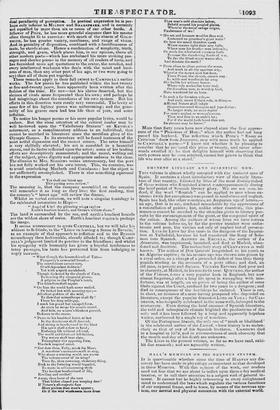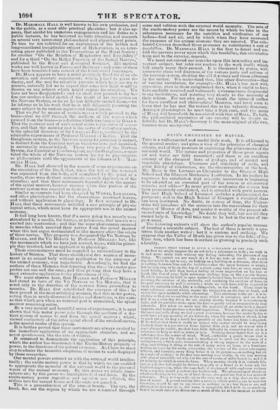HALL'S MEMOIRS ON THE NERVOUS SYSTEM.
IT is questionable whether since the time of HARVEY any dis- covery has been made in physiology so important as that developed in these Memoirs. With this oirnion of the work, our readers need not fear that we are about to inflict upon them a dry medical treatise, or to call their attention to a subject void of general in- terest. It cannot but be highly interesting to every enlightened mind to understand the laws which regulate the various functions of our corporeal frame, and to trace, by means of the nervous sys- tem, our mental and physical connexion with the external world. Dr. MARSHALL HALL ie well known to his own profession, and to the public, as a most able practical physician ; but it also ap-
pears, that amidst his numerous engagements and his duties as a public lecturer, he has bestowed no little attention and research on several very Interesting philosophical awl physioloeical points. To him we are indebted for an explanation of the hidden and long-considered inexplicable snbject of Hybernation. in an inter- esting paper published in the Transactions of the Royal Society : for another "On the Relation of Respiration and Irrimbility ir • and for a third "On the Reflex Functien of the Spinal Marrow," • published by the Royal awl Zooloeical Sucieties. Ilk medical • works are well known in France awl Germany : and smne of them
have been translated into several of the Continental languages. ; Dr. HALL appears to have a mind peculiarly fitted fur elese oh- ; servation and accurate experiment; which, jeined to great in- • dustry, and the zeal for scientiSc pursuits which he is knewn to possess, naturally led us to expect that some new Lela would be , thrown on any subject which might engage his attention. We have not been disappointed : and ‘ve shall now proceed to lay be- i fore our readers a brief sketch of the reeult of his resealches on the Nervous System, as far as he has hitherto carried thew,—for be informs us in his work that he is still dilieently pursuing the same subject in its various aspects and ramifisations. That we feel by means of certain nerves which prsceed to the brain—that we will throueh the medium of the nerves which proceed from the brain—is a doctrine which was tang at. Ly GALEN. That the posterior root of each spinal nerve is the nerve of 6en,stz- lion, and that the anterior root is the nerve of rf.dantqr y 7120!1.911, Is the splendid discovery of Sir CHARLES Dem., coofirmiel bv the admirable experiments of Professor Miimadt ef Buries. That the Ganglionic system, as the Nervous system for nettitioa is termed, is distinct from the Cerebral system wideli we have just described, is universally acknowledged. These two parts of the Nervous System. the Cerebral or Cerebro-spitial, awl the Ganglionic, cin.t i- tuted the whole of the Nervous system kie.wn to physioluvists or philosophers until the appearance of the labours or L Men- sneer. HALL.
Dr. HALL had observed in the course of some experitneuts on the circulation of the blood, that, whim the tail of the water-eft was separated from the body, and stimulated ty the point of a needle, there were distinct movements on each application of the stimulus; and that these movements depended upon the agency of the spinal marrow, because ceasine when this portion of the nervous system was removed or destroyed.
Similar movements had been observed by Wnyrr, LEGALLOIS, and other physiologists ; but the observations remained barren, and without application to physielogy. It first occurred to Dr. HALL that these movements unfolded a new principle of physio- logical action, which must have its appropriate use in the animal economy.
It had long been known, That if a nerve going to a muscle were stimulated by a needle, the forceps, or galvanism, that muscle was excited into contraction ; and that the same phcenomena occurred in muscles which received their nerves fern the spinal marrow when this last organ is stimulated in like manner above the origin of those nerves. This property was designated the Vis Nervosa by HALLER, and the Vis Motoria by Professor Miieeeet; but, like the movements which we have just noticed, these, with the princi- ple they involved, had no application to physiology. These circumstances must be regarded as extraordinary in the history of Science. That there should exist two sources of move- nient in an animal body without application to the purposes of the animal economy, was improbable. Accordingly, we find the authors of these Memoirs first detecting that these two motor pro- perties are one and the same, and then peeing that they have a roost extensive application to the phrenomena of lire.
We must observe here, that HALLER and Professor Miieeee bad stated as laws of the Vis Nervosa or Vis Moturia, that it acted only in the direction of the nervous fibres proceeding to muscles. Dr. Hem. first established the converse of this : he then proved in the most satisfying manner, that this motor puwer, acting thus in newly-discoveled modes arid direetiuirs. is the same as that which acts when an external part is stimulated, the spinal marrow remaining entire. By a very natural and beautiful series of experiments, it is next shown that this motor poxes wets through the medium of a dis- tinct system of nerves to and from the seinal marrow ; which, viewed exclusively of the infra spinal chord of the cerebral nerves, is the special centre of this system. It is further proved that these movements are always excited by the immediate application of an appropriate stimulus, and are never spontaneous, like the acts of volition.
It remained to demonstrate the application of this principle, which the author has denominated the Excito-Motory property or power, to the functions of the animal economy. And here we must stop to admire the beautiful adaptation of means to ends displayed by these researches.
Our mental powers connect us with the external world intellec- tually; the excito.motory power is that by which we are enabled to appropriate the material of the external world to the phesical wants of the animal economy. By this power we inhale atmo- spheric air; by this power we ingureitate feel and drink. By the excito-motory power ingestien and eeeeti in are effected, the orifices into the animal frame and the exits are guarded. This is a generalization of the utmost beauty. The eye, the hand, &c. are the organs by which we are connected through
sense and volition with the external world mentally. The acts of the excito-motory power are the means by which we take in the substances necessary for the nutrition and vivification of our bodies—food and air, and by which when they have answered the purposes of the animal economy they are rejected. The cele- brated GUVIRR described these processes as constituting a sort of tourbillon. Dr. MARSHALL HALL is the first to detect and un- fold the nervous power upon which this tourbillon, this circulation from and to the exterior, depends.
We must not extend our remarks upon this intemsting, and portaat subject, but refer our readers to the work itself; which will amply repay their perusal. It is illustrated by plates, with timorous plans and diagrams of the various parts and actions of the nervous system, showing the old dectrines and those advanced' by the author. We understand that, like other discoveries—that of vaccine inoculation, for example—Dr. HALL'S has met with opposition, even in these enlightened days, when it ought to have been cordially received and welcomed; a circumstance disgraceful to our institutions, and pointing very clearly to the necessity of their reform. For our own part, we thank the talented author for these excellent and philosophical Memoirs, and trust soon to learn that he has met the reward due to his valuable discovery. Amongst physiologists he must take a high rank, and the name of HALL will henceforth be associated with that of BELL. To both, the philosophical reputation of our country will be deeply in- debted; but Dr. Ileee's discovery is the more original of the two, because more unexpected.



















































 Previous page
Previous page